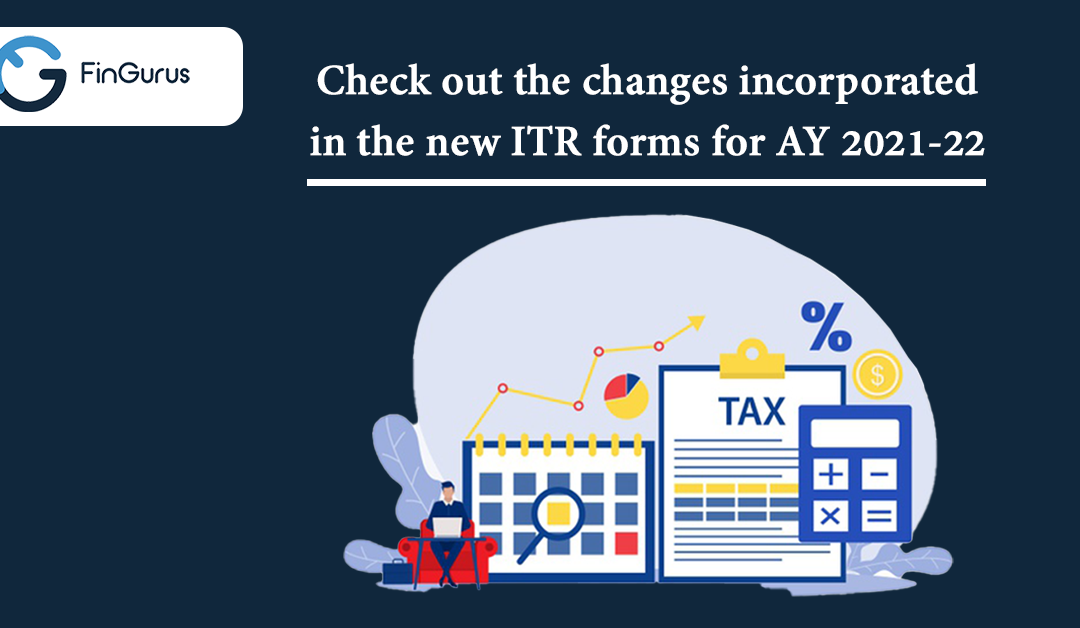In a release on the 1st of April, the Finance Ministry put forth that the Central Board of Direct Taxation (CBDT) has informed about the new Income Tax Return (ITR) Forms, ITR-1 to ITR-7, for the financial year 2021-22. Given the present Covid scenario in the country and to smoothen the process for the taxpayers, no notable modifications have been incorporated in the new ITR forms if compared with the last years’ ones. Only some slight changes have been made, that too, due to the amendments in the tax laws. Read on to know more about the new notifications and the changes incorporated in the new ITR forms.
What are the New Changes?
When it comes to talking about the changes incorporated in the new ITR forms, the first point that needs to be mentioned is that the taxpayers will now have a dedicated space to describe their investments in the ITR forms – ITR Form 1(Sahaj), ITR Form 2, ITR Form 3, ITR Form 4 (Sugam), ITR Form 5, ITR Form 6, ITR Form 7 and ITR-V.
Moreover, as per the notification by CBDT, no changes regarding the ITR form filing process have been introduced. Therefore, it needs to be filled according to the modification incorporated last year.
The ITR Form 1, that is, Sahaj, and the ITR form 4 (Sugam) are the simpler forms and will serve the needs of a large number of medium and small taxpayers.
Taxation Under the New Regime
The new ITR forms will be asking the taxpayers if they are opting for the new taxing scheme.
The government had given the option of choosing a new tax plan under Section 115BAC of the Income Tax Act in the fiscal year 2020-21. This new tax regime will apply to the taxpayers who are not taking benefits of any special deductions or exemptions while evaluating their taxable income.
As per this regime, individuals having an annual income within Rs. 2.5 lakh will be exempt from taxation, and the ones earning between Rs. 2.5 lakh and Rs. 5 lakh will fall under the 5% taxation slot. People whose income falls in the range of Rs. 5 lakh and Rs. 7.5 lakh will be taxed at 10%, and the quota of 15% will be applicable for the ones earning Rs. 7.5 lakh to Rs. 10 lakh.
To be taxed at 20%, the individual’s earnings should fall in the range of Rs. 10 lakh to Rs. 12.5 lakh, and for 25%, the income will be in the middle of Rs. 12.5 lakh and Rs. 15 lakh. Individuals earning more than Rs. 15 lakh will be taxed at a rate of 30%.
Eligibiity for ITR Form 1
Sahaj or the ITR Form 1 can be filed by taxpayers when they fulfill the below-mentioned criteria:
- The person should have an income of up to Rs. 50 lakhs
- The specified income can be from the salary, one house property, or other sources such as interests.
However, it has been specified that the individuals whose income tax is put off on ESOPs will not be allowed to avail the ITR Form 1. Moreover, the taxpayers will now have to put forth the reason for claiming benefit on the payment of advance tax and quarterly dividend income.
Eligibility for ITR Form 4
ITR Form 4, also known as Sugam, can be used by individuals, firms (other than Limited Liability Partnerships), Hindu Undivided Families (HUFs) having a total income of up to Rs. 50 lakhs and income from professions or business that is computed or assessed under the Presumptive Taxation provisions.
Other Significant Points to Note:
- Individuals and HUFs who do not earn any income from business or profession ( and are not eligible for filing Sahaj) can file the returns using ITR Form 2. And, those having income from profession or business can use the ITR Form 3.
- ITR Form 5 can be used by persons other than individuals, HUFs, and companies like LLPs (Limited Liability Partnership), partnership firms, etc.
- The ITR Form 6 can be used by the companies.
- Political parties, trusts, or charitable organizations will file using the ITR Form 7.
Key Takeaway
Keeping in mind the current Covid-19 situation and to minimize the compliance burden, the government has decided not to incorporate any significant changes in the new ITR forms. Nonetheless, the nominal modifications also need to be checked to keep you away from any future hassles. Therefore, go through the changes and feel free to get in touch with FinGurus for any financial assistance.

